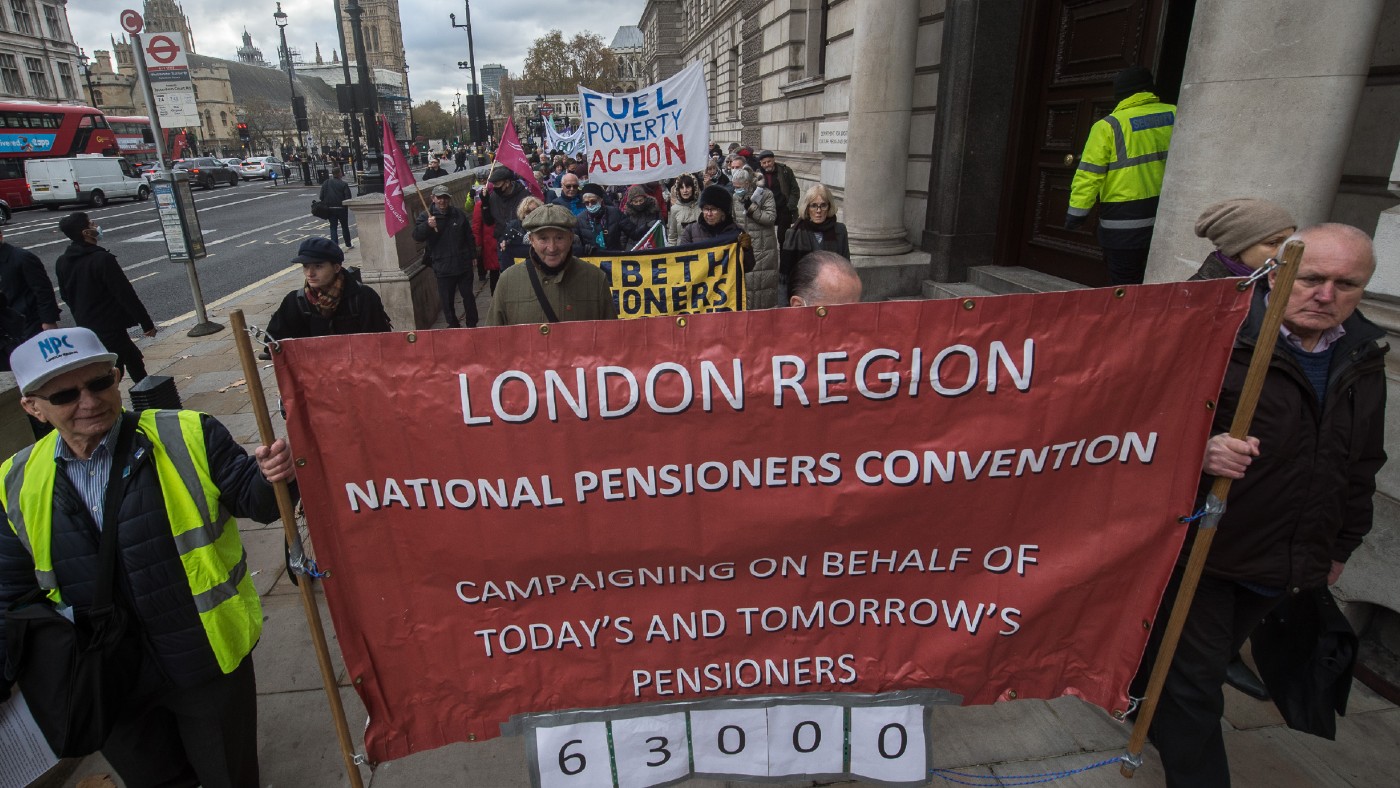Should areas with lower life expectancy receive an early pension?
Data shows those in affluent areas live ‘significantly longer’ than people in deprived regions

A free daily email with the biggest news stories of the day – and the best features from TheWeek.com
You are now subscribed
Your newsletter sign-up was successful
A review of the UK’s state pension age will ask whether people in areas with different life expectancies should receive their pension at different times.
The Department for Work and Pensions (DWP) announced on Tuesday that it plans to “consider differences across countries and regions, including Northern Ireland” when reviewing whether the current rules around pensionable age should be amended.
The current state pension age for men and women is 66 years for those born before April 1960, 67 years for those born in the month of or after April 1960, and 68 years for those born in the month of or after April 1977.
The Week
Escape your echo chamber. Get the facts behind the news, plus analysis from multiple perspectives.

Sign up for The Week's Free Newsletters
From our morning news briefing to a weekly Good News Newsletter, get the best of The Week delivered directly to your inbox.
From our morning news briefing to a weekly Good News Newsletter, get the best of The Week delivered directly to your inbox.
Between 2018 until the start of 2020, the average UK life expectancy was 79 years for men and 82.9 years for women. However, the Covid pandemic triggered life expectancy losses “not seen since World War II”, according to a study by the Leverhulme Centre for Demographic Science at the University of Oxford.
Compared with 2019, life expectancy in England in 2020 was “1.3 years lower for men and 0.9 years lower for women”, government figures show.
Live long and prosper
According to The King’s Fund, a health-focused think tank, people living in affluent areas live “significantly longer” than those in deprived areas. In 2017-19, men living in the top 10% most affluent areas in England had a life expectancy of 83.5 years, compared with just 74.1 years in the top 10% most deprived areas.
The think tank attributed “much of this inequality” to “higher mortality from heart and respiratory disease, and lung cancer in more-deprived areas”.
A free daily email with the biggest news stories of the day – and the best features from TheWeek.com
The gap in healthy life expectancy is even greater than the gap in life expectancy itself between the most and least deprived areas, added The King’s Fund.
Men living in the most deprived areas spend 21.8 years, or “nearly a third of their lives in poor health”, compared with 12.8 years or about a sixth of their lives for men in more affluent areas.
North-south divide
In addition, data has shown a “persistent” divide between the north and south of England both in life expectancy and healthy life expectancy.
People living in the south of England live longer and have more years in better health than those living further north. In 2018-20, the life expectancy for women was seven years lower “in Blackpool, Middlesbrough, Manchester and Liverpool than in Westminster, Kensington and Chelsea and Camden”, said the think tank.
Some of the areas with the lowest life expectancies “are in the red wall seats won by the Conservatives at the last election”, pointed out David Byers, assistant money editor at The Times.
‘Impossible, in practice’
According to the paper, financial experts believe that the government’s long-awaited “levelling-up” agenda – which seeks to address regional health inequalities – could be used to dictate pension policy.
Steve Webb, the former Liberal Democrat pensions minister, told The Times that paying a state pension earlier in more deprived areas could be “impossible, in practice”, given how regularly people move house.
Instead, he suggested that the government delays the pension rise to 68 or older until areas with a poorer life expectancy “catch up”, adding: “The idea is you identify the problem areas and work to drive up life expectancies there.”
As well as considering differences in life expectancy across countries and regions, the government will also be analysing the impact on life expectancy for individuals “with different characteristics and opportunities”, said the DWP.
Between 2044 and 2046, people will start receiving their pension at the age of 68. However, the government is looking into whether this increase should be brought forward, to 2037-39. This would affect people born from the early 1970s onwards.
The pension age was reviewed in 2017 and the latest review is being carried out between now and May 2023.
“As the number of people over state pension age increases, due to a growing population and people on average living longer, the government needs to make sure that decisions on how to manage its costs are robust, fair and transparent for taxpayers now and in the future,” said the DWP in a statement.
Kate Samuelson is The Week's former newsletter editor. She was also a regular guest on award-winning podcast The Week Unwrapped. Kate's career as a journalist began on the MailOnline graduate training scheme, which involved stints as a reporter at the South West News Service's office in Cambridge and the Liverpool Echo. She moved from MailOnline to Time magazine's satellite office in London, where she covered current affairs and culture for both the print mag and website. Before joining The Week, Kate worked at ActionAid UK, where she led the planning and delivery of all content gathering trips, from Bangladesh to Brazil. She is passionate about women's rights and using her skills as a journalist to highlight underrepresented communities. Alongside her staff roles, Kate has written for various magazines and newspapers including Stylist, Metro.co.uk, The Guardian and the i news site. She is also the founder and editor of Cheapskate London, an award-winning weekly newsletter that curates the best free events with the aim of making the capital more accessible.
-
 Crisis in Cuba: a ‘golden opportunity’ for Washington?
Crisis in Cuba: a ‘golden opportunity’ for Washington?Talking Point The Trump administration is applying the pressure, and with Latin America swinging to the right, Havana is becoming more ‘politically isolated’
-
 5 thoroughly redacted cartoons about Pam Bondi protecting predators
5 thoroughly redacted cartoons about Pam Bondi protecting predatorsCartoons Artists take on the real victim, types of protection, and more
-
 Palestine Action and the trouble with defining terrorism
Palestine Action and the trouble with defining terrorismIn the Spotlight The issues with proscribing the group ‘became apparent as soon as the police began putting it into practice’
-
 Six ways to boost your finances in 2026
Six ways to boost your finances in 2026The Explainer It’s not too late to make a new year’s resolution to finally get organised money-wise
-
 The financial impact of returning to work in later life – should you 'unretire'?
The financial impact of returning to work in later life – should you 'unretire'?The Explainer Many people return to the workplace after retirement age, but what could it mean for your finances?
-
 State pension underpayments: are you getting the right amount?
State pension underpayments: are you getting the right amount?feature Hundreds of thousands of women may have received less than they were owed
-
 Early retirement: what is the ‘FIRE’ movement?
Early retirement: what is the ‘FIRE’ movement?feature Younger workers are aiming to quit the workforce early through extreme saving and investment
-
 How women can bridge the gender pension gap
How women can bridge the gender pension gapIn Depth New figures have shown the extent of the problem for women in retirement years
-
 How to plug the pension gap by buying National Insurance credits
How to plug the pension gap by buying National Insurance creditsfeature A temporary change in the state pension offers a ‘golden opportunity’
-
 Are UK pensions safe?
Are UK pensions safe?Today's Big Question Bank of England governor says its debt market support must end – but the multi-billion-pound scheme could be extended
-
 Pensions: time to end the triple lock?
Pensions: time to end the triple lock?In the Spotlight Ministers must decide whether to risk alienating older voters by ending guaranteed pension rises